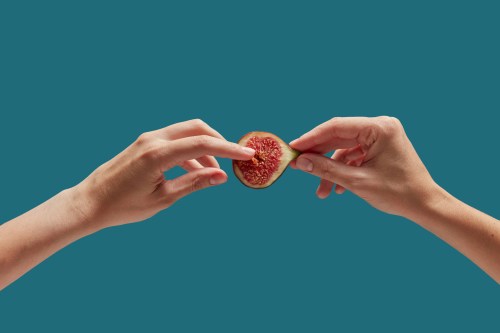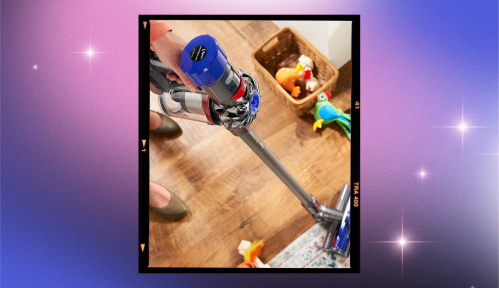Our editors independently select these products. Making a purchase through our links may earn Well+Good a commission
Anyone with an Instagram back when Kate McKinnon was regularly playing a convincing Hilary Clinton on SNL and Pete Davidson was dating Cazzie David (i.e. late 2016) may remember when unicorn-themed beauty and food products were as prevalent on your social feed as soft launches and carousels are now. Unicorn lattes and Frappuccinos are no longer on Starbucks drink menus, and beauticians likely haven’t received requests for unicorn hair or make-up in years. But the mythical creature is still in circulation—most notably amongst sex-plorers, kinksters, and non-monogamists describing a unicorn in a relationship.
Experts in This Article
relationship coach, sex and polyamory educator, and co-creator and co-host of the Mutiamory podcast
certified sex therapist
polyamory educator, advocate, writer, and influencer
author of Boyslut: A Memoir and Manifesto, sex expert for Archer, and sex and relationships expert at Fun Factory
When used in a sex and relationships context, the term “unicorn,” sometimes “sex unicorn,” describes a person who is interested in having simultaneous romantic and/or sexual relationships with both people in a preexisting coupling, explains Leanne Yau, the educator behind Poly Philia, a social media project dedicated to education and entertainment on polyamory and non-monogamy. “They are called unicorns because they are thought to be tough to find, almost mythical,” adds sex educator and writer Zachary Zane, author of Boyslut: A Memoir and Manifesto and sex expert for dating app Archer.
Generally speaking, swingers and folks in (sexually) open relationships are looking for a unicorn for a one-night stand or consistent threeways. Meanwhile, folks who are polyamorous may be interested in adding another individual to their relationship and forming a romantic polyamorous triad (also known as a throuple), says Yau.
But whether sex, love, or some other romantic attachment is in play, the dynamic between a unicorn and a pre-existing couple can be incredibly pleasurable for everyone involved—so long as communication, consent, and respect are at the forefront of all interactions.
What it means to be a unicorn in a relationship or during sex
As noted, a unicorn in a relationship is a person who chooses to enter a preexisting partnership for a threesome (sex) or triad (usually, sex and love), says Gigi Engle, ACS, CSE, CSC, a certified sex coach with dating app 3Fun and author of All The F*cking Mistakes. Often, it is assumed (and expected) that the unicorn will be equally physically and—in cases where romance is allowed and desired—emotionally connected to both people in the preexisting relationship, she notes. (In this way, dating a unicorn is a form of non-monogamy that involves a couple opening up to a single third person.)
A unicorn can be a person of any gender, and the couple entertaining one can include two people of any gender and sexual orientation combination. But most commonly, the term is used to refer to a cisgender, bisexual woman who is interested in dating and/or having sex with a preexisting couple that is made up of a straight man and bisexual (or bi-curious) woman, says Yau.
Notably, the connotation of “unicorn” and some of the dynamics that can unfold around unicorn dating have made the term controversial, says Engle. Some claim that the term’s association with an animal can dehumanize the third party just as its fantastical nature can reinforce the (false) idea that this person is really just a creature destined to fulfill the fantasies of the people in the couple.
At the same time, the concept of “unicorn hunting,” whereby a couple searches for a unicorn, implies that the unicorn is their “prey,” which can set up an uneven, harmful power dynamic: In having a pre-existing relationship, the people in the couple may feel as if they’re empowered to dictate the rules of the new unicorn relationship, leaving the unicorn with less autonomy over their own relationship status.
“There is unfortunately a precedent of many unicorn-hunting couples being predatory, fetishizing, and queer- and trans-phobic,” says sex and polyamory educator Dedeker Winston, author of The Smart Girl’s Guide to Polyamory and co-host of the Multiamory podcast. “Many self-identified unicorns report all kinds of bad behavior from couples, including being expected to provide free childcare or conveniently disappear when friends or family come around, or ultimately, being treated as a disposable sex toy,” she says.
That’s not to say that all unicorns want to join an existing couple for an emotional connection or anything beyond sex; in fact, plenty of unicorns may be solely interested in sex with a couple. But the important thing is that the unicorn retains their autonomy and humanity at all stages of the relationship and is equally as empowered as the couple to act on their desires in the partnership—whatever they may be.
Assuming such a fair dynamic is in play, the term “unicorn” can shed some of its negative connotations. Indeed, some people adore the term and use it to describe themselves with pleasure, says Engle.
Why someone may want to be a unicorn in a relationship
1. It presents the opportunity for group sex galore
On the sexual front, joining a preexisting couple can be a really fun way to have three-way sex, says Yau. “In many cases, the unicorn gets treated like the star of the show by the couple and gets sexually pampered, appreciated, and spoiled by the other two people,” she says. This can be especially appealing to folks who enjoy being submissive.
Plus, you’re joining two people who are already familiar with having sex with each other, which can help reduce the likelihood of the kind of awkward moments that may be more common when three total strangers have sex.
2. It can be a low(er) commitment relationship style
How committed the unicorn is to the two people in the preexisting dynamic will depend on a variety of things, such as the couple’s relationship structure and rules, the unicorn’s interest, and the romantic and emotional chemistry among everyone.
If you are interested in getting your own sexual needs and fantasies tended to without the emotional labor often required during dating, Zane suggests being a unicorn to a couple that is romantically closed, but sexually open. “If you’re looking for a casual, lower-commitment thing, then joining a couple that isn’t looking for romance is a great way to have light, fun, casual group sex,” he explains.
3. It can create a container for a lot of love
Sure, being a unicorn can give you access to lower-commitment sex. But if you date a couple that is explicitly polyamorous and declares an openness to romancing and loving other individuals, being a unicorn can also give way to loving, reciprocal, committed relationships with two other individuals, says Yau.
Here, not only do you get to give and receive love from two different people, but also, you get to watch their love. “Some people find it really nice to be with two people who are also with and in love with each other, and have that three-way romantic dynamic,” says Yau.
Important note: When a unicorn and the couple enter into a romantic relationship, the unicorn isn’t simply tacking onto the original dynamic, says Yau. “A whole new relationship is being created,” she says. (The result is what would be called a triad or a throuple.)
Why a couple may want to date a unicorn
1. It promotes sexual novelty
When everyone involved is on the same page about what sex acts are on and off limits, what everyone’s personal boundaries are, and what barriers and birth control methods are being implemented (if any), sex between a unicorn and a preexisting couple can be super hot and pleasurable.
“It can be really fun to bring someone new into your bedroom and have sex with them together,” says Yau. “It gives you the opportunity to explore a new sexual dynamic together, which can inject novelty into your relationship,” she says.
Important note: If you and your partner have a particular dynamic or fantasy you are hoping to live out with this third person, make sure to communicate that with them long before clothes start coming off so that they can opt into or out of it, says Yau. “If the couple doesn’t consult the third person about what they want ahead of time, it can create a bad dynamic where the unicorn doesn’t feel empowered to speak up about their needs.”
2. It may feel like a safer foray into non-monogamy
“For some couples, having their existing partner by their side while dating someone new can offer a sense of stability and security,” Winston says. After all, you get a front-row seat to your partner dating, falling for, and romancing someone else.
Just note that “dating someone together still cannot completely insulate you from any feelings of jealousy, threat, or discomfort,” Winston caveats. Any kind of non-monogamous or even monogamish relationship structure creates the possibility for those negative feelings to arise.
So, it’d be in your best interest to sit down with your partner and come up with a game plan for what you’ll do if (nay, when!) one of you starts to feel jealous after adding a unicorn to your relationship. Too often, couples do not come up with that contingency plan in advance, and then abort Mission Unicorn as soon as uncomfortable feelings pop up, which can leave both of you feeling disappointed, and just as importantly, the unicorn feeling used and discarded.
3. It can affirm your sexual orientation
Just so we’re not perpetuating any false misconceptions about bisexuality, let’s be very clear: Many people who are bisexual, pansexual, or any other polysexual orientation can be totally happy and content in a monogamous relationship with a person of the same or a different gender.
However, for polysexual folks who are non-monogamous—or simply like the idea of being sexually or romantically open with their current partner at this stage in their dating journey—dating a unicorn may have extra appeal. “Bringing in a unicorn can be a great way to explore the bi+ part of yourself, for people to whom that applies,” says Zane. If you are a bisexual woman dating a man, for example, inviting in a unicorn who is not a man can be really sexual-orientation affirming, he says.
So you want to date (or be!) a unicorn…
If you’re in a relationship and want to date a unicorn ethically, or you’re a single person who’d like to become one, it’s a good idea to read up on polyamory and open relationships and do some introspection.
To start, spend some time thinking about what you personally want romantically and/or sexually. “Whether you are a couple looking for a unicorn or the inverse, you’re going to need to be very clear about what you’re looking for,” says Zane. Are you interested in a one-time thing? Do you want to be wooed? Do you have space in your heart and life for romance to develop? “Whatever it is, you’re going to need to figure out how to put words to it, so you can talk about it with all three people and make sure that everyone is on the same page,” he says.
As for finding a unicorn or couple? Winston recommends using a sex-positive or kink-positive website or dating app, such as Feeld, #Open, or 3Fun. If there is a local kink or polyamory scene in your area, you may also consider in-person meet-up groups or potlucks, she says.
Remember: It is okay to take your time to evaluate if you have chemistry or a possible foundation of friendship with a potential unicorn or couple before immediately trying to have a threesome or form a triad with them, says Winston. “In a lot of ways, [developing a unicorn relationship] is just like regular dating.” (Touché!)
Sign Up for Our Daily Newsletter
Get all the latest in wellness, trends, food, fitness, beauty, and more delivered right to your inbox.
Got it, you've been added to our email list.











